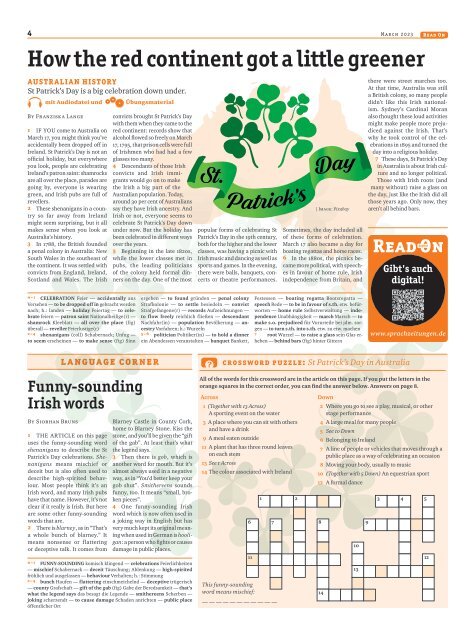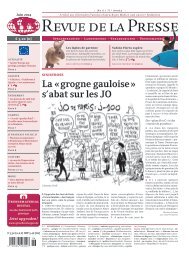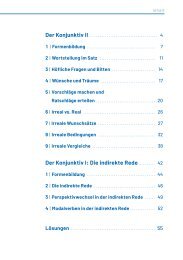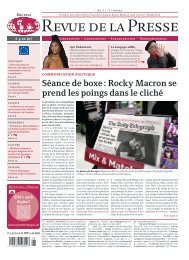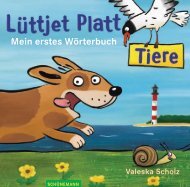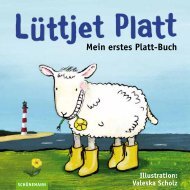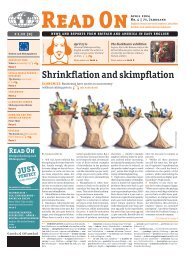Erfolgreiche ePaper selbst erstellen
Machen Sie aus Ihren PDF Publikationen ein blätterbares Flipbook mit unserer einzigartigen Google optimierten e-Paper Software.
4 March <strong>2023</strong> <strong>Read</strong> <strong>On</strong><br />
How the red continent got a little greener<br />
AUSTRALIAN HISTORY<br />
St Patrick’s Day is a big celebration down under.<br />
mit Audiodatei und<br />
By Franziska Lange<br />
1 IF YOUcome to Australia on<br />
March 17, you might think you’ve<br />
accidentally been dropped off in<br />
Ireland. St Patrick’s Day is not an<br />
official holiday, but everywhere<br />
you look, people are celebrating<br />
Ireland’s patron saint: shamrocks<br />
are all over the place, parades are<br />
going by, everyone is wearing<br />
green, and Irish pubs are full of<br />
revellers.<br />
2 These shenanigans in a country<br />
so far away from Ireland<br />
might seem surprising, but it all<br />
makes sense when you look at<br />
Australia’s history.<br />
3 In 1788, the British founded<br />
a penal colony in Australia: New<br />
South Wales in the southeast of<br />
the continent. It was settled with<br />
convicts from England, Ireland,<br />
Scotland and Wales. The Irish<br />
Übungsmaterial<br />
convicts brought St Patrick’s Day<br />
with them when they came to the<br />
red continent: records show that<br />
alcohol flowed so freely on March<br />
17, 1795, that prison cells were full<br />
of Irishmen who had had a few<br />
glasses too many.<br />
4 Descendants of those Irish<br />
convicts and Irish immigrants<br />
would go on to make<br />
the Irish a big part of the<br />
Australian population. Today,<br />
around 30 per cent of Australians<br />
say they have Irish ancestry. And<br />
Irish or not, everyone seems to<br />
celebrate St Patrick’s Day down<br />
under now. But the holiday has<br />
been celebrated in different ways<br />
over the years.<br />
5 Beginning in the late 1820s,<br />
while the lower classes met in<br />
pubs, the leading politicians<br />
of the colony held formal dinners<br />
on the day. <strong>On</strong>e of the most<br />
popular forms of celebrating St<br />
Patrick’s Day in the 19th century,<br />
both for the higher and the lower<br />
classes, was having a picnic with<br />
Irish music and dancing as well as<br />
sports and games. In the evening,<br />
there were balls, banquets, concerts<br />
or theatre performances.<br />
| Image: Pixabay<br />
Sometimes, the day included all<br />
of these forms of celebration.<br />
March 17 also became a day for<br />
boating regattas and horse races.<br />
6 In the 1880s, the picnics became<br />
more political, with speeches<br />
in favour of home rule, Irish<br />
independence from Britain, and<br />
there were street marches too.<br />
At that time, Australia was still<br />
a British colony, so many people<br />
didn’t like this Irish nationalism.<br />
Sydney’s Cardinal Moran<br />
also thought these loud activities<br />
might make people more prejudiced<br />
against the Irish. That’s<br />
why he took control of the celebrations<br />
in 1895 and turned the<br />
day into a religious holiday.<br />
7 These days, St Patrick’s Day<br />
in Australia is about Irish culture<br />
and no longer political.<br />
Those with Irish roots (and<br />
many without) raise a glass on<br />
the day, just like the Irish did all<br />
those years ago. <strong>On</strong>ly now, they<br />
aren’t all behind bars.<br />
Gibt's auch<br />
digital!<br />
0 – 1 CELEBRATION Feier — accidentally aus<br />
Versehen — to be dropped off in gebracht werden<br />
nach; h.: landen — holiday Feiertag — to celebrate<br />
feiern — patron saint Nationalheilige(r) —<br />
shamrock Kleeblatt — all over the place (fig)<br />
überall — reveller Feierlustige(r)<br />
2 – 4 shenanigans (coll) Schabernack; Unfug —<br />
to seem erscheinen — to make sense (fig) Sinn<br />
ergeben — to found gründen — penal colony<br />
Strafkolonie — to settle besiedeln — convict<br />
Strafgefangene(r) — records Aufzeichnungen —<br />
to flow freely reichlich fließen — descendant<br />
Nachfahr(in) — population Bevölkerung — ancestry<br />
Vorfahren; h.: Wurzeln<br />
5 – 6 politician Politiker(in) — to hold a dinner<br />
ein Abendessen veranstalten — banquet Bankett,<br />
Festessen — boating regatta Bootsregatta —<br />
speech Rede — to be in favour of s.th. etw. befürworten<br />
— home rule Selbstverwaltung — independence<br />
Unabhängigkeit — march Marsch — to<br />
make s.o. prejudiced für Vorurteile bei jdm. sorgen<br />
— to turn s.th. into s.th. etw. zu etw. machen<br />
7 root Wurzel — to raise a glass sein Glas erheben<br />
— behind bars (fig) hinter Gittern<br />
www.sprachzeitungen.de<br />
Funny-sounding<br />
Irish words<br />
By Siobhan Bruns<br />
language corner<br />
1 THE ARTICLEon this page<br />
uses the funny-sounding word<br />
shenanigans to describe the St<br />
Patrick’s Day celebrations. Shenanigans<br />
means mischief or<br />
deceit but is also often used to<br />
describe high-spirited behaviour.<br />
Most people think it’s an<br />
Irish word, and many Irish pubs<br />
have that name. However, it’s not<br />
clear if it really is Irish. But here<br />
are some other funny-sounding<br />
words that are.<br />
2 There is blarney, as in “That’s<br />
a whole bunch of blarney.” It<br />
means nonsense or flattering<br />
or deceptive talk. It comes from<br />
Blarney Castle in County Cork,<br />
home to Blarney Stone. Kiss the<br />
stone, and you’ll be given the “gift<br />
of the gab”. At least that’s what<br />
the legend says.<br />
3 Then there is gob, which is<br />
another word for mouth. But it’s<br />
almost always used in a negative<br />
way, as in “You’d better keep your<br />
gob shut”. Smithereens sounds<br />
funny, too. It means “small, broken<br />
pieces”.<br />
4 <strong>On</strong>e funny-sounding Irish<br />
word which is now often used in<br />
a joking way in English but has<br />
very much kept its original meaning<br />
when used in German is hooligan:<br />
a person who fights or causes<br />
damage in public places.<br />
0 – 1 FUNNY-SOUNDINGkomisch klingend — celebrations Feierlichkeiten<br />
— mischief Schabernack — deceit Täuschung; Ablenkung — high-spirited<br />
fröhlich und ausgelassen — behaviour Verhalten; h.: Stimmung<br />
2 – 4 bunch Haufen — flattering einschmeichelnd — deceptive trügerisch<br />
— county Grafschaft — gift of the gab (fig) Gabe der Beredsamkeit — that’s<br />
what the legend says das besagt die Legende — smithereens Scherben —<br />
joking scherzendt — to cause damage Schaden anrichten — public place<br />
öffentlicher Ort<br />
Across<br />
1 (Together with 13 Across)<br />
A sporting event on the water<br />
3 A place where you can sit with others<br />
and have a drink<br />
9 A meal eaten outside<br />
11 A plant that has three round leaves<br />
on each stem<br />
13 See 1 Across<br />
crossword puzzle: St Patrick’s Day in Australia<br />
All of the words for this crossword are in the article on this page. If you put the letters in the<br />
orange squares in the correct order, you can find the answer below. Answers on page 8.<br />
14 The colour associated with Ireland<br />
This funny-sounding<br />
word means mischief:<br />
— — — — — — — — — — —<br />
Down<br />
2 Where you go to see a play, musical, or other<br />
stage performance<br />
4 A large meal for many people<br />
5 See 10 Down<br />
6 Belonging to Ireland<br />
7 A line of people or vehicles that moves through a<br />
public place as a way of celebrating an occasion<br />
8 Moving your body, usually to music<br />
10 (Together with 5 Down) An equestrian sport<br />
12 A formal dance<br />
1 2 3 4 5<br />
6 7 8 9<br />
11 12<br />
14<br />
10<br />
13


